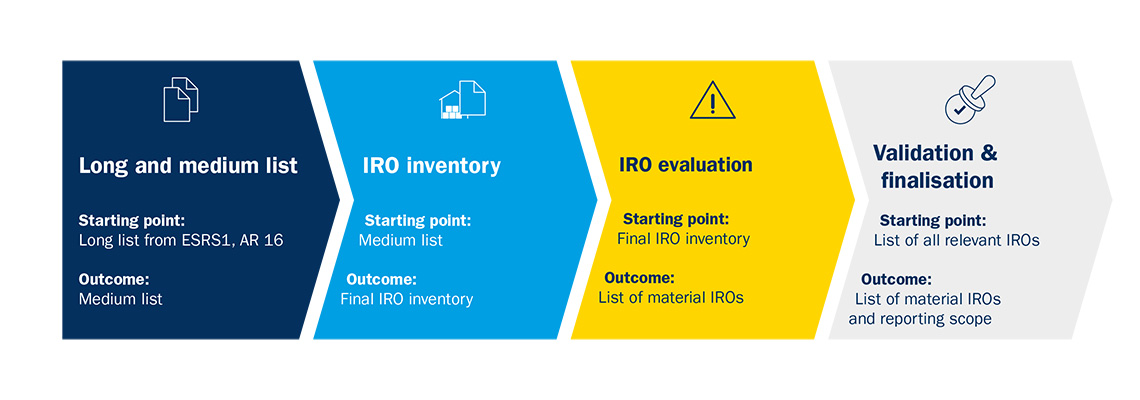ESRS 2 – Strategy
ESRS 2 SBM-2 – Interests and views of stakeholders
Engaging in regular dialogue on sustainability topics with the various stakeholder groups is an important part of Interzero’s sustainability strategy. Accordingly, it is essential to know the needs, requirements and interests of the company’s key stakeholder groups. This cooperation and exchange of experiences is aimed at jointly developing solutions for sustainable improvements. Many sustainability requirements can only be met by pursuing an interdisciplinary approach and working together with others.
Interzero maintains active communications with several major stakeholder groups, which include (potential) customers, suppliers, business partners, employees, the Works Council and management staff, policymakers and government agencies, science and research, and consumers.
- In guiding progress towards a circular economy, Interzero makes use of many working groups within industry associations and initiatives. Examples include the Federation of the German Waste, Water and Raw Materials Management Industry (BDE) and the German CEO Alliance for Climate and Economy (Stiftung Klimawirtschaft). (See ESRS G1-5.) As a provider of circular services, Interzero is also a regular exhibitor at expert and industry conferences. The company is in touch with a wide variety of circular economy actors at a regional, national and international level.
- For customers and potential customers, Interzero offers regular courses and resources on important individual aspects of the circular economy, for example webinars on packaging optimisation, the circular economy, sorting technology and battery recycling. Customers and other interested stakeholders are also invited to participate in the annual ‘Future Resources’ expert conference held in partnership with relevant magazines from the packaging industry. In customer-specific workshops, ideas for the closed-loop management of a wide range of products and materials are worked on together with customers. Our annual Sustainability Magazine also offers an informative review of initiatives, projects and successful examples of the circular economy in practice. Interzero has set itself the goal of further intensifying its dialogue with customers and the company’s social media channels are one point of focus here.
Interzero sees the dissemination of information about the circular economy as an important instrument for the promotion of sustainable business practices. This engagement has therefore been integrated into this report as an entity-specific topic (see ESRS entity-specific topic: Providing information about the closed-loop economy).
- Interzero maintains a constant dialogue with its suppliers with the aim of safeguarding high standards of business in relation to sustainability and environmental responsibility. The company uses regular audits to check for compliance with requirements and works with its partners on improvement programmes. This close collaboration helps to strengthen sustainable and long-term partnerships.
- For its staff communications, Interzero utilises a variety of communication and dialogue channels, tailored to meet the needs of different groups. The company intranet hosts a wide variety of information and news. The Executive Management sends out ad-hoc bulletins (Interzero Note) by email. These are supplemented by dialogue-driven resources like the company’s social intranet (Interzero Voice), which also circulates surveys on individual topics. Shopfloor employees are also kept informed about recent developments in the Group by screens and posters in the main areas of plants as well as by their own supervisors. Interzero also publishes an employee magazine, ‘Circle’, which introduces new products and provides information about the company’s contribution to the circular economy. The Board uses regular town hall meetings (Interzero Meet, also streamed online) to provide updates in person on current developments in the Interzero Group. Interzero has also appointed a dedicated team of ‘Sustainability Ambassadors’. These individuals organise short campaigns and long-term staff initiatives aimed at fostering discussions of sustainability topics or giving detailed advice on improving sustainability in our day-to-day (working) lives. Feedback from the workforce is also collected during the annual employee appraisal meetings. Computerised tools are used here to measure employee satisfaction and survey staff opinion in detail on specific topics.
- Interzero also works closely with members of the scientific community to ensure transparency about the ecological impact of the circular economy and its own work, and to share these data with its own stakeholders and the general public. As one example, Interzero commissions Fraunhofer UMSICHT to conduct an annual study called ‘resources SAVED by recycling’. According to the 2023 study, Interzero’s closed-loop management of around 2.5 million tonnes of recyclables saved more than 11.1 million tonnes of primary raw materials and avoided about 1.2 million tonnes of greenhouse gas (GHG) emissions.
- Together with employees, customers and partners, Interzero aims to maximise the contribution it makes to climate change mitigation and resource conservation – and keep pushing back Earth Overshoot Day. The Global Footprint Network makes this contribution measurable. According to calculations made by researchers, the global Earth Overshoot Day would occur 7 minutes and 12 seconds earlier without Interzero’s achievements.







